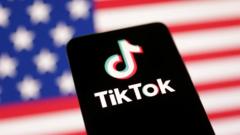The Supreme Court is poised to hear TikTok's final appeal against a potential ban in the United States, a case that brings forward key discussions regarding national security, free speech, and foreign influence. TikTok stands as a critical battleground in the ongoing debate about the intersection of tech innovation with national sovereignty.
TikTok contends that the law, which mandates disconnection from its Chinese ownership or faces a shutdown, violates First Amendment rights for its approximately 170 million American users. This law, enacted last year with bipartisan backing in Congress, reflects escalating concerns over the app's connection to the Chinese government through its parent company, ByteDance. The U.S. government claims that TikTok carries distinct risks of espionage and manipulation, asserting that the Chinese regime could exploit the app to access sensitive user data or influence content displayed to American citizens.
Despite lower courts siding with the government's stance, TikTok's legal efforts have gained complexity following recent political dynamics, particularly the change in administration. President-elect Donald Trump suggested a pause in enforcing the law to explore negotiation routes after meeting with TikTok management. However, the Supreme Court's ultimate decision remains uncertain, and experts note that cases weighing national interest against constitutional rights often lean in favor of the government.
While Congress's law does not impose an outright ban on TikTok usage, it threatens to eliminate the app by restricting major tech platforms from offering it. The looming deadline of January 19, 2025, adds urgency to TikTok's plea. The company warns that a ban would significantly impact free speech, arguing that regulations should pivot on concrete evidence of wrongdoing instead of hypothetical fears.
Simultaneously, the conversation surrounding TikTok's future influences potential business moves as investors line up for opportunities if the app faces severe restrictions. Notable political figures, including Trump's former Treasury Secretary and others, have shown interest in acquiring TikTok, underscoring the intricate dance of political, economic, and social elements surrounding this case.
The growing dissent from users, who feel the potential ban threatens their rights to free expression, emerges through multiple lawsuits contesting this legislation. Organizations like the ACLU back these sentiments, calling for authentic evidence of harm rather than speculative claims.
Legal analysts suggest that the Supreme Court's conservative majority may still lean towards favoring the government in this landmark decision, but continuing advocacy for user rights and the potential for novel political solutions complicate the path forward. As both sides brace for this significant ruling, the ramifications for TikTok could redefine not just the app's future, but also the landscape of digital expression in the U.S.
TikTok contends that the law, which mandates disconnection from its Chinese ownership or faces a shutdown, violates First Amendment rights for its approximately 170 million American users. This law, enacted last year with bipartisan backing in Congress, reflects escalating concerns over the app's connection to the Chinese government through its parent company, ByteDance. The U.S. government claims that TikTok carries distinct risks of espionage and manipulation, asserting that the Chinese regime could exploit the app to access sensitive user data or influence content displayed to American citizens.
Despite lower courts siding with the government's stance, TikTok's legal efforts have gained complexity following recent political dynamics, particularly the change in administration. President-elect Donald Trump suggested a pause in enforcing the law to explore negotiation routes after meeting with TikTok management. However, the Supreme Court's ultimate decision remains uncertain, and experts note that cases weighing national interest against constitutional rights often lean in favor of the government.
While Congress's law does not impose an outright ban on TikTok usage, it threatens to eliminate the app by restricting major tech platforms from offering it. The looming deadline of January 19, 2025, adds urgency to TikTok's plea. The company warns that a ban would significantly impact free speech, arguing that regulations should pivot on concrete evidence of wrongdoing instead of hypothetical fears.
Simultaneously, the conversation surrounding TikTok's future influences potential business moves as investors line up for opportunities if the app faces severe restrictions. Notable political figures, including Trump's former Treasury Secretary and others, have shown interest in acquiring TikTok, underscoring the intricate dance of political, economic, and social elements surrounding this case.
The growing dissent from users, who feel the potential ban threatens their rights to free expression, emerges through multiple lawsuits contesting this legislation. Organizations like the ACLU back these sentiments, calling for authentic evidence of harm rather than speculative claims.
Legal analysts suggest that the Supreme Court's conservative majority may still lean towards favoring the government in this landmark decision, but continuing advocacy for user rights and the potential for novel political solutions complicate the path forward. As both sides brace for this significant ruling, the ramifications for TikTok could redefine not just the app's future, but also the landscape of digital expression in the U.S.





















